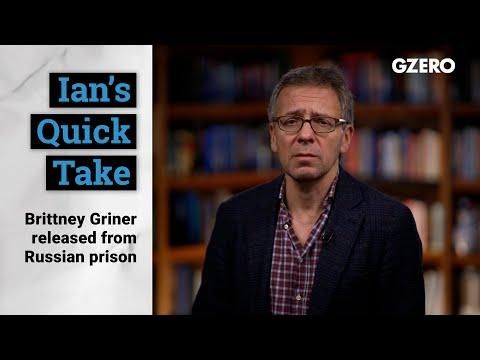December 09, 2022
Ian Bremmer's Quick Take: Hi, there. Ian Bremmer here. A Quick Take, wanted to opine for just a couple of minutes on Brittney Griner, who is back in the United States a free woman, and we're of course, happy to be able to announce that. But what do we think about this deal and what it means going forward?
Of course, we're happy whenever an American citizen is released when they've been unjustly held, in this case, essentially hostage for 10 months by an authoritarian Russian government with no rule of law. Yes, she had committed a crime. She brought in some hashish that she was vaping with, and that was a very stupid act in Russia. But the idea that she was going to get nine years in jail for it, no, absolutely not. This was, of course, the Russians making a point with an American celebrity and wanting to juice that orange for as much as they possibly could. And they did.
They got Viktor Bout, who was called the "Merchant of Death," certainly aging at this point, but has been held in the United States. One of the most notorious arms dealers in the world. Do I think this is a fair trade? No, of course I don't. Because the Americans care about the lives of their citizens much more than the Russians do, and it's unacceptable that we should have to negotiate with Russia. On the other hand, I'm glad she's back, and I also feel like the Americans are doing an awful lot to punish the Russians right now, irrespective the specifics of this individual deal. To wit, we're talking about massive military support for Ukraine, which is helping destroy the Russian arms space. Their military has been diminished radically on the back of military support that has been led by the United States, as well as economic sanctions being led by the United States that is taking billions and billions of dollars out of Putin's pocket, the pockets of the oligarchs that have supported him, and, of course, the Russian economy as a whole.
So, the reality is that's far more important than the back and forth of this individual hostage deal. And the fact that an exchange has been made and the Americans now have a citizen, a valued citizen, back in the country is a good thing. Having said that, Paul Whelan is an American citizen who's now been in Russia for over four years, also illegally detained a hostage, and he's not back. And we should not be happy about that. Biden clearly took longer on the Griner deal because he was trying to get Whelan freed, as well. Did not happen. They're clearly disappointed about that. No one more than Whelan's own family.
Also true, under two years of the Trump administration, there was interest from the State Department in securing Whelan's release. Did not happen. It wasn't a huge priority, and they weren't able to secure his release. That is the story here. The fact that Putin is not just a war criminal in Ukraine, but also does not believe in the human rights of, pretty much, any citizens around the world, is indifferent, and plays power politics whenever he has a small piece of leverage. And in this case, he has a couple of small pieces of leverage. But overall, of course, Russia is in very serious decline because of missteps that Putin has made and because of leadership by the United States and American allies in NATO and all over the world in responding to that unjust war.
So, that's where we are. Delighted to see Britney back in the United States. Still have more work to do on Paul Whelan. Still have a lot more work to do on this Russian regime. That's it for me. I'll talk to you all real soon.More For You
World Central Kitchen staff hand out free soup in a neighbourhood that experiences electricity and heating outages following recent Russian attacks on Ukraine’s civilian infrastructure during subzero temperatures in Kyiv, Ukraine February 3, 2026.
REUTERS/Thomas Peter
1,170: The number of high-rise buildings in Kyiv that were left without heating following a barrage of Russian attacks last night on Ukraine’s capital and its energy facilities, per Kyiv Mayor Vitali Klitschko.
Most Popular
What We’re Watching: US critical minerals summit, Rafah crossing reopens, Border violence in Pakistan
Feb 02, 2026
U.S. President Donald Trump and Japanese Prime Minister Sanae Takaichi hold up signed documents regarding securing the supply of critical minerals and rare earths, at a bilateral meeting at Akasaka Palace in Tokyo, Japan, October 28, 2025.
REUTERS/Evelyn Hockstein
Representatives from the European Union, United Kingdom, Japan, and others will meet in Washington this week to discuss a strategic alliance on critical minerals.
Hard numbers: Large protests in Czechia, UAE-linked firm has large stake in the president’s company, & More
Feb 02, 2026
People take part in a rally in support of Czech President Petr Pavel, organised by Million Moments for Democracy group in reaction to dispute between President Pavel and Czech Foreign Minister and Motorists chair Petr Macinka, in Prague, Czech Republic, February 1, 2026.
REUTERS/Eva Korinkova
80,000: The number of people estimated to be in the streets of Czechia on Sunday to show their support for President Petr Pavel after he blocked the nomination of an environmental minister who performed the Nazi salute and posted Nazi memorabilia.
US President Donald Trump and musician Nicki Minaj hold hands onstage at the US Treasury Department's Trump Accounts Summit, in Washington, D.C., USA, on January 28, 2026.
REUTERS/Kevin Lamarque
The US has started handing $1,000 to the bank accounts of newborn babies. But can policies like this one help boost sagging birthrates in advanced democracies?
© 2025 GZERO Media. All Rights Reserved | A Eurasia Group media company.
